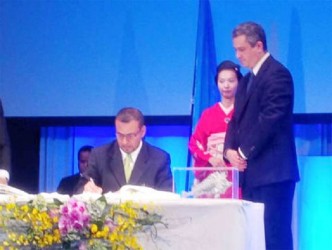Guyana has signed on to a new international pact to control mercury emissions and has won the support of Japan in its call for discontinue use through gradual phasing out.
Minister of Natural Re-sources and the Environment Robert Persaud signed the Minamata Convention on Mercury

on behalf of the government at a just concluded international conference, organised by the United Nations Environment Program (UNEP) from October 9 to 11, in Minamata, Japan.
The Government Information Agency (GINA) reported that Persaud indicated to the conference that the Guyana government recognises the environmental and human health risks of mercury use and supports the implementation of a global legally binding instrument on mercury that will examine its supply and trade, mercury-added products, manufacturing products in which mercury compounds are used, artisanal and small scale mining, emission, releases, storage and mercury wastes.
At the same time, he said that the government proposed, for the forum’s consideration, a phased approach which should give parties time to prepare for the implementation of the procedures and provisions. The government is also in favour that the provision of financial and technical assistance to achieve compliance under the convention is essential.
This approach, GINA reported Persaud as saying, has been supported by the Guyana Gold and Diamond Miners Association (GGDMA), while discussions were held with Amerindian and riverain communities.
“Minister Persaud further stated that Guyana has recognised the need to adhere to the principle of “common but differentiated responsibilities” and proposed the phased implementation of the global legally binding instrument on mercury over a period of 10 years. In this regard, the Japan Government pledged its support to Guyana for phasing out the use of mercury,” GINA reported.
Persaud also held bilateral discussions with the Japanese Environment Minister Nobuteru Ishihara, who reiterated his country’s plan to provide US$2B in financial assistance to fight mercury pollution. Discussions were also held with UNEP Executive Director Achim Steiner to support Guyana’s phasing out measures, it noted.
GINA said that Guyana’s recommendations for financial support considered environmental education, capacity building activities, adoption of unambiguous gold mining policy, the strengthening of governmental institutions charged with environmental compliance, monitoring and, introduction and adoption of low-mercury or mercury-free gold-processing technologies. Further, the country holds that international mechanisms should be instituted for North to South delivery of technical assistance and viable alternative technologies in order to facilitate readiness for the implementation of the policy.
GINA said Guyana recognised that the treaty addresses a global consensus that mercury use currently poses serious health and environmental risks, but is also cognisant of the need to be flexible and appreciative of the constraints that some countries will face in implementing the Convention. A phased approach can address these constraints and ensure broader support for the Convention, it added.
In addition to the proposed phased approach to end usage, GINA said that the country also outlined an Action Plan to minimise and, where feasible, eliminate mercury releases to air, water, and land from wastes by adopting Environmentally Sound Management (ESM). “It was proposed that the plan be implemented and completed within five years of its approval; preferably from 2013 to 2017,” it said.
Persaud was accompanied to the conference by the Commissioner (ag) of the Guyana Geology Mines and Commission (GGMC) Rickford Vieira.
On Thursday, Head of the Presidential Secretariat Dr. Roger Luncheon announced that Guyana will from this year begin implementing measures to phase out the use of mercury in mining, with a phasing in of restrictions against importation from now until 2022.
Miners have used mercury to separate gold for decades, but part of it is lost in the process, contaminating rivers and soils. The use of mercury, which is toxic to human health and the environment, in gold mining is governed by strict regulations here but compliance is another matter.
Mercury is primarily used to create an amalgam with the gold, and is later heated to separate it. In the process of heating, unless a retort is used, the mercury then enters the atmosphere, and precipitates back into the water, from where it enters the ecosystem, and the food chain. A retort is a closed container, which traps and condenses the mercury vapour without releasing it into the atmosphere.
However, some miners use mercury in sluice boxes which eventually leads to the pits being spiked. This system of mercury use is particularly dangerous, as it introduces mercury directly into the water system. Countries such as the United States and the European Union have already banned the export of mercury.




